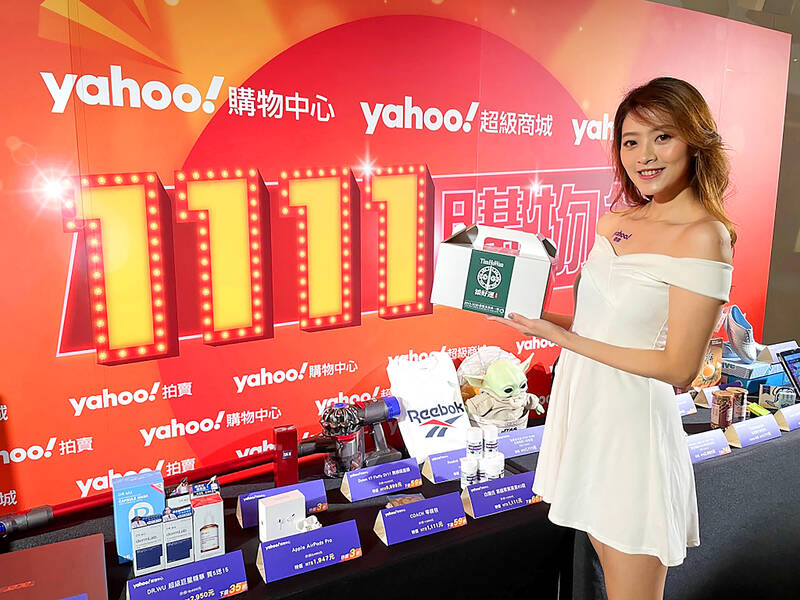Food conglomerate Uni-President Enterprises Corp (統一企業) has acquired convertible corporate bonds issued by Yahoo Taiwan Holdings Ltd (雅虎), setting its sights on cooperating with Yahoo in e-commerce.
In a statement released on Friday, Uni-President said its subsidiary Cayman President Holdings Ltd spent US$25 million to acquire Yahoo Taiwan’s corporate bonds, adding that the investment would not target any stake ownership in Yahoo, but did not rule out teaming up with Yahoo in e-commerce.
The food giant said the group has put a wide range of products on Yahoo’s e-commerce platform for many years, and that the two sides have forged close business ties.

Photo: CNA
If Uni-President and Yahoo team up in e-commerce development, the cooperation is expected to enhance the food supplier’s competitive edge in this field, as Yahoo has built a large pool of e-commerce talent and is capable of providing prompt logistics services to local consumers after doing business in Taiwan for more than two decades, Uni-President said.
At present, Uni-President owns Books.com.tw (博客來), which generates almost NT$8 billion (US$256 million) in revenue per year by selling books and miscellaneous items online, while President Chain Store Corp (統一超商), which owns more than 6,000 7-Eleven convenience stores in Taiwan, launched iOPEN Mall in March last year to further penetrate the e-commerce sector.
In addition, Uni-President’s organic food unit Santa Cruz (聖德科斯) sells fresh meat, seafood, vegetables and fruit online, while Cosmed (康是美), a health and beauty unit, also owns the online eShop.
In recent years, Uni-President has devoted itself to building a regional logistics platform by integrating its offline and online retail capabilities, with its business spanning across Asia including China, South Korea, the Philippines, Vietnam, Thailand and Indonesia. In Taiwan, Uni-President operates 45 logistics centers.
The company’s consolidated sales last year grew 10.74 percent year-on-year to NT$580.99 billion.

SELL-OFF: Investors expect tariff-driven volatility as the local boarse reopens today, while analysts say government support and solid fundamentals would steady sentiment Local investors are bracing for a sharp market downturn today as the nation’s financial markets resume trading following a two-day closure for national holidays before the weekend, with sentiment rattled by US President Donald Trump’s sweeping tariff announcement. Trump’s unveiling of new “reciprocal tariffs” on Wednesday triggered a sell-off in global markets, with the FTSE Taiwan Index Futures — a benchmark for Taiwanese equities traded in Singapore — tumbling 9.2 percent over the past two sessions. Meanwhile, the American depositary receipts (ADRs) of Taiwan Semiconductor Manufacturing Co (TSMC, 台積電), the most heavily weighted stock on the TAIEX, plunged 13.8 percent in

A wave of stop-loss selling and panic selling hit Taiwan's stock market at its opening today, with the weighted index plunging 2,086 points — a drop of more than 9.7 percent — marking the largest intraday point and percentage loss on record. The index bottomed out at 19,212.02, while futures were locked limit-down, with more than 1,000 stocks hitting their daily drop limit. Three heavyweight stocks — Taiwan Semiconductor Manufacturing Co (TSMC, 台積電), Hon Hai Precision Industry Co (Foxconn, 鴻海精密) and MediaTek (聯發科) — hit their limit-down prices as soon as the market opened, falling to NT$848 (US$25.54), NT$138.5 and NT$1,295 respectively. TSMC's

TARIFFS: The global ‘panic atmosphere remains strong,’ and foreign investors have continued to sell their holdings since the start of the year, the Ministry of Finance said The government yesterday authorized the activation of its NT$500 billion (US$15.15 billion) National Stabilization Fund (NSF) to prop up the local stock market after two days of sharp falls in reaction to US President Donald Trump’s new import tariffs. The Ministry of Finance said in a statement after the market close that the steering committee of the fund had been given the go-ahead to intervene in the market to bolster Taiwanese shares in a time of crisis. The fund has been authorized to use its assets “to carry out market stabilization tasks as appropriate to maintain the stability of Taiwan’s

In a small town in Paraguay, a showdown is brewing between traditional producers of yerba mate, a bitter herbal tea popular across South America, and miners of a shinier treasure: gold. A rush for the precious metal is pitting mate growers and indigenous groups against the expanding operations of small-scale miners who, until recently, were their neighbors, not nemeses. “They [the miners] have destroyed everything... The canals, springs, swamps,” said Vidal Britez, president of the Yerba Mate Producers’ Association of the town of Paso Yobai, about 210km east of capital Asuncion. “You can see the pollution from the dead fish.